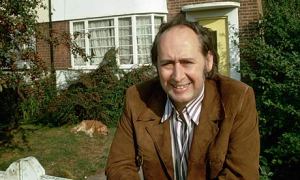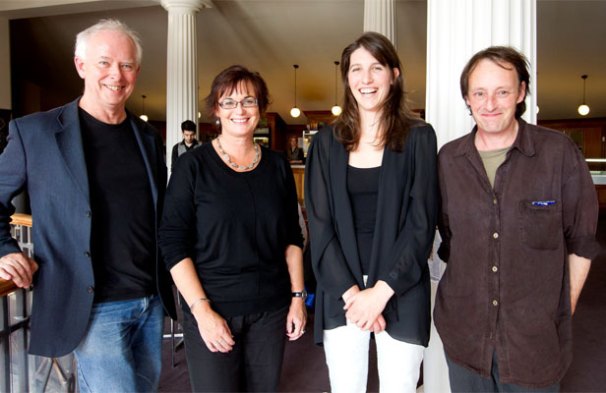
INTERVIEWER
So, how do you write, exactly?
BALLARD
Actually, there’s no secret. One simply pulls the cork out of the bottle, waits three minutes, and two thousand or more years of Scottish craftsmanship does the rest.
Obviously the Ballard here is J.G., in his Paris Review interview. Here is the author of, at his death in 2009, 18 novels and by my count 22 assorted collections of short fiction. In 1984, when he said this, James Graham was 54 and had published 10 novels and 15 of those collections. What lies behind this perfect little quote is an enormous lived treatise on the faith and will of writing.
J.G. is turning irritably in his grave right now, but hear me out.
In 1964, three novels into his career, Ballard’s wife died of pneumonia. In his joyous, playful The Kindness of Women he rewrote his own biography such that she dies after a fall at a Spanish beach resort. He is forced to drive his three children home to their dusty semi in Shepperton, TW17. Imagine that drive.

J.G. Ballard outside his house in Shepperton.
Shepperton, to his readers, is an otherwise banal London commuter circuit suburb luminous with his fiction: its reservoirs clasping drowned light aircraft in their waving weeds; its leafy green über-English foliage poised trembling ready to explode into a precisely and passionately observed tropical rainforest; its residents walking as if lost in a dream, ready for their deviating sexualities to emerge and find their fullest expression on church pews and dashboards.
What he did, just three novels in, his wife dead, age thirty-four, was to drive home to Shepperton with his three bereaved children, and commence the unimaginable task of bringing them up alone and writing his life’s work. And though Miriam died of pneumonia, not of a mysterious concussion in the back of a Catalan ambulance, whether or not he verifiably drove those children home doesn’t matter. Because that is what he did. He drove them home from the place of their mother’s death, and then he drove them to school in the morning, every morning, and came home, poured himself a large Teacher’s at (I like to imagine) about 9:15 (elsewhere in a very generous and humanising admission he talks of it calming his nerves), and commenced on the next 500 to 1000 words of some of the most devastating, numinous, repetitive, terrifying, sad, monotonous, prophetic, hilarious fiction we keep from the latter half of the twentieth century. (Martin Amis called Ballard’s fiction “at once totally humourless and entirely unserious”: his persistently strange work always rewards the paradoxical juxtaposition, and like all the biggies, he always reveals his reviewer.)
This is an act, behind his—and any big writer’s—apparent bravado, Godlikeness, unassailability (I don’t ever think of McCarthy sitting down to Blood Meridian and murmuring “Oh, I just can’t enter into this imaginatively today”): an act of faith, and of will. Because the weird catch-22 or ouroboros of novel writing is that to do the creative, imaginative work of making a piece of prose ring in a reader’s imagination, to raise and fire an undoubted world with bounce and blood and passion such that the reader has total faith in it, you must have faith in yourself. It’s a requirement.
It may sound trite. But consider this: out of nowhere, you’re say 24 and haven’t hardly finished a proper emotion let alone a thing we might call a book, you’re required to have faith that this tiny two-inch corner you’re painting right now will form an inevitable, essential, closely examinable and yet seemingly seamless and unremarkable part of a huge, huge canvas (you know only it’s really big) that you don’t know the exact dimensions of yet. (There’s a not-small element of bluff.) Because if you don’t have that faith then the brushstrokes, the mark making, will be incongruous; tiny, perfect details here; broad evocative strokes out there when you got confident but ran out of time/material/story/whatever. Pacing all wrong. Result: “Patchy”—L. Patchett, Listener. “Uneven”—Michiko Kakutani, NYT.
So because it’s me and not, well, you, I’m actually talking about, back to the first person: the catch: in order to do what I need to do and what I know I can’t do, or certainly have no prior evidence I can do, I must have faith in myself that I can indeed do this miraculous thing. Faith is a synonym here for love of self. But also, over time, as the fiction progresses, for me, faith in the people of the fiction. Faith in the world as it is transformed into the fiction. Faith as synonym for love of world. (Of course what also works is support of community, of family etc., apposite energies or obsessions like anger, loss, love, big passions which can be channelled, etc., Scotch.) Will is the element of getting myself into the position to have faith. “I will, every day, be here at this time doing this thing and if you think I won’t and that I will fuck this up like I fucked those other things up you’re about to get a lesson in will.” Or something equally self-exhortatory, vociferous, not to say strident. This is our only time and our only time in the sun; bitching about publishing and about debt and stress and hard work and tiredness and failure and dumbing down of this and that are just ways of not doing what I really have to do.
Don DeLillo has a lovely bit about will, in Underworld:
“Have you come across the word velleity? A nice Thomistic ring to it. Volition at its lowest ebb. A small thing, a wish, a tendency. If you’re low-willed, you see, you end up living in the shallowest turns and bends of your own preoccupations.”
It’s a Jesuit talking to a young man. And I can see it’s kind of scary in isolation from the big sepia warmth of that book. It’s not just about set teeth and application of trouser seat to chair, as Kingsley Amis has it. Here’s Ballard, at his desk every morning in his, let’s face it, filthy house, his three children (three children) off at school, with his glass of Scotch, commencing on the next page of the novel, of his alternative affirmation of the psychosexual horror-comedy of the twentieth century.
And before I tell you what he does next, looking down at what he’s written, there’s another thing I might mention, apart from writing, and books, that is the result of this exercise of faith and will. Bill Manhire reports on always feeling like the youngest person in the room. And it’s written all over his face. Seamus Heaney said, “All poets are young poets really, that’s the beauty of it.” It was written all over his face too.
There are writers out there, and unhappy, frantic-seeming people with intense inner lives who haven’t found their work, who only calm under the weight of a task. I think of them like certain teenagers, all power and energy and no direction. Give them a task, give them a weight to bear, precisely calibrated just above their expectations of themselves. And they may bitch and moan, but the weight must be such they are forced to concentrate, and calm. There is a peace.
And there’s more. Because here’s Ballard, 34, with his three children, his debts, no doubt, and his memories of murder, atrocity, torture and starvation. His lost wife. He looks down at what he’s just written and chuckles.
Carl Shuker is the 2013 Writer in Residence at Victoria University of Wellington. His books include The Lazy Boys and The Method Actors. His latest novel is Anti Lebanon. Asked to recommend Ballard titles, Carl writes: ‘For new readers I’d say definitely start with the canonical Crash, or for those more squeamish, The Drowned World. And for the wonderful transmogrification of Shepperton: The Unlimited Dream Company.’
Carl is representing the MA year 2001 at the IIML Alumni Reading on Sunday 29 September from 7.30pm at Circa Theatre, Wellington.












